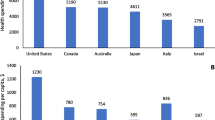Abstract
Purpose
Access to insurance for a loan or a mortgage is an important issue for childhood cancer survivors. The aim of this study was to describe difficulties experienced by adult survivors.
Methods
A total of 1920 survivors treated before the age of 18 in five French cancer centers responded to a questionnaire in 2010. Survivors who had tried to obtain a loan were asked if they had experienced difficulties, which were defined as experiencing rejection, higher premiums, or exclusions. The questionnaire investigated health problems related to the circulatory, respiratory, digestive, urinary, endocrine, hormonal, and nervous systems. Second tumors, diabetes mellitus, cardiac disease, and stroke were ascertained from a physician’s report or medical records. Multivariable analyses were conducted to identify the characteristics of survivors reporting difficulties.
Results
Difficulties were experienced by 10.4% of those who had tried to obtain a small loan (n = 787) and by 30.1% of those who had tried to obtain a home loan (n = 909). Disclosure of childhood cancer to the insurer and amputation surgery were negatively associated with insurance accessibility, even when controlling for age, gender, education, health-related unemployment, familial situation, and severe or life-threatening conditions such as cardiovascular diseases, second cancers, or diabetes.
Conclusion
This study showed that the financial burden of cancer can extend decades after diagnosis.
Implications for Cancer Survivors
Thanks to a 2016 law, French cancer survivors no longer have to disclose their cancer to insurers after a fixed number of years. This law will probably lessen the socioeconomic burden of cancer.


Similar content being viewed by others
References
Kaatsch P. Epidemiology of childhood cancer. Cancer Treat Rev. 2010;36(4):277–85. doi:10.1016/j.ctrv.2010.02.003.
Trama A, Botta L, Foschi R, Ferrari A, Stiller C, Desandes E, et al. Survival of European adolescents and young adults diagnosed with cancer in 2000-07: population-based data from EUROCARE-5. Lancet Oncol. 2016; doi:10.1016/S1470-2045(16)00162-5.
Oeffinger KC, Mertens AC, Sklar CA, Kawashima T, Hudson MM, Meadows AT, et al. Chronic health conditions in adult survivors of childhood cancer. N Engl J Med. 2006;355(15):1572–82. doi:10.1056/NEJMsa060185.
de Boer AGEM, Verbeek JHAM, van Dijk FJH. Adult survivors of childhood cancer and unemployment: a metaanalysis. Cancer. 2006;107(1):1–11. doi:10.1002/cncr.21974.
Dumas A, Berger C, Auquier P, Michel G, Fresneau B, Setcheou Allodji R, et al. Educational and occupational outcomes of childhood cancer survivors 30 years after diagnosis: a French cohort study. Br J Cancer. 2016;114(9):1060–8. doi:10.1038/bjc.2016.62.
Kirchhoff AC, Leisenring W, Krull KR, Ness KK, Friedman DL, Armstrong GT, et al. Unemployment among adult survivors of childhood cancer: a report from the childhood cancer survivor study. Med Care. 2010;48(11):1015–25. doi:10.1097/MLR.0b013e3181eaf880.
Boman KK, Lindblad F, Hjern A. Long-term outcomes of childhood cancer survivors in Sweden: a population-based study of education, employment, and income. Cancer. 2010;116(5):1385–91. doi:10.1002/cncr.24840.
Wengenroth L, Sommer G, Schindler M, Spycher BD, von der Weid NX, Stutz-Grunder E, et al. Income in adult survivors of childhood cancer. PLoS One. 2016;11(5):e0155546. doi:10.1371/journal.pone.0155546.
Dumas A, De Vathaire F, Vassal G. Access to loan-related insurance for French cancer survivors. Lancet Oncol. 2016;17(10):1354–6. doi:10.1016/S1470-2045(16)30452-1.
Joly F, Heron JF, Kalusinski L, Bottet P, Brune D, Allouache N, et al. Quality of life in long-term survivors of testicular cancer: a population-based case-control study. J Clin Oncol. 2002;20(1):73–80.
Mols F, Thong MSY, Vissers P, Nijsten T, van de Poll-Franse LV. Socio-economic implications of cancer survivorship: results from the PROFILES registry. Eur J Cancer. 2012;48(13):2037–42. doi:10.1016/j.ejca.2011.11.030.
Mols F, Thong MSY, Vreugdenhil G, van de Poll-Franse LV. Long-term cancer survivors experience work changes after diagnosis: results of a population-based study. Psycho-Oncology. 2009;18(12):1252–60. doi:10.1002/pon.1522.
Noorda EM, van Kreij RH, Vrouenraets BC, Nieweg OE, Muller M, Kroon BB, et al. The health-related quality of life of long-term survivors of melanoma treated with isolated limb perfusion. Eur J Surg Oncol. 2007;33(6):776–82. doi:10.1016/j.ejso.2006.03.024.
Tamminga SJ, Bultmann U, Husson O, Kuijpens JL, Frings-Dresen MH, de Boer AG. Employment and insurance outcomes and factors associated with employment among long-term thyroid cancer survivors: a population-based study from the PROFILES registry. Qual Life Res. 2016;25(4):997–1005. doi:10.1007/s11136-015-1135-z.
Acknowledgements
We wish to thank the patients, the clinicians, and all the research staff who participated in the study, in particular Martine Labbé, Isao Kobayashi, and Angéla Jackson.
Author information
Authors and Affiliations
Corresponding author
Ethics declarations
The study received approval from the French Data Protection Authority (CNIL) and from the ethics committee of the National Institute of Medical Research and Health (INSERM). The investigators obtained informed consent from each participant.
Funding
The data collection of the cohort study was funded by the French state (Agence Nationale de la recherche (Hope-EPI grant), Institut National du Cancer, Agence Française de Sécurité Sanitaire et des Produits de Santé, Institut de Recherche en Santé Publique, Programme Hospitalier de Recherche Clinique), French charities (Ligue Nationale Contre le Cancer, Fondation ARC), and one foundation (Fondation Pfizer pour la santé de l’enfant et de l’adolescent). The analysis on insurance accessibility was supported by the Fondation Gustave Roussy.
Conflict of interest
The authors declare that they have no conflict of interest.
Electronic supplementary material
.
ESM 1
(DOCX 52 kb)
Rights and permissions
About this article
Cite this article
Dumas, A., Allodji, R., Fresneau, B. et al. The right to be forgotten: a change in access to insurance and loans after childhood cancer?. J Cancer Surviv 11, 431–437 (2017). https://doi.org/10.1007/s11764-017-0600-9
Received:
Accepted:
Published:
Issue Date:
DOI: https://doi.org/10.1007/s11764-017-0600-9



